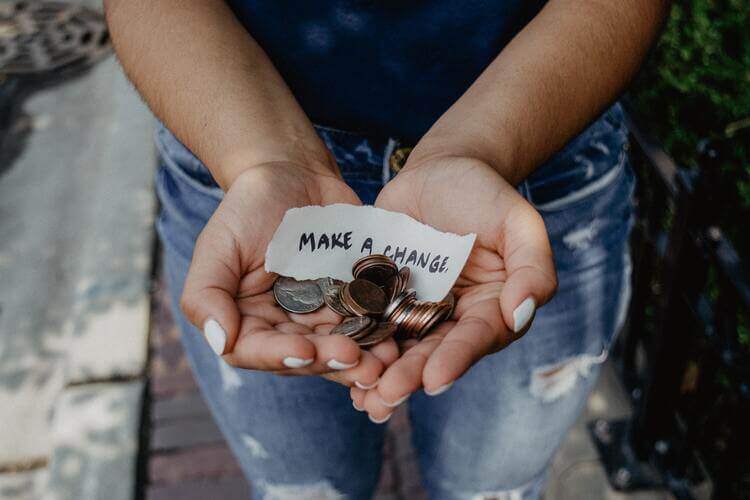Going Home For The Holidays: Financial Intimacy Style
Dec 01, 2021
It’s that time of year where we think about being with our families and about the family that we do not have.
It can be both a joyful and sorrowful time of year.
The holidays evoke a wide range of emotions and feelings.
As I like to tell my clients it is a psychologically activating time of year and it is okay if you are not showing up in the ways that you normally do.
This year as you are working on your relationship with yourself, your partner, and your money, your trip home to be with family during the holidays, is a great opportunity to observe and see where some of your money patterns came from.
There is a lot to be learned while you’re home for the holidays whether it is with your or your partner's family.
I am going to ask you to step out of your comfort zone, be with family, and then reflect on what’s going to change.
Stepping Outside Your Comfort Zone
For many of my clients, it can be particularly difficult to take an honest look at their family and the way that it has shaped them. I have been there, and yes even now I still get reluctant to acknowledge how my family has shaped me and continues to shape me. Yet it is in this process of observing and questioning our family that we can learn, heal and grow.
One way to approach the holidays with your family and continue on your money journey is to approach your trip home like an anthropologist.
Let’s keep it simple for now.
Here are five things to observe with curiosity.
- The neighborhood your family lives in now and how it is similar and different to the one you live in yourself.
- What are the things that get said and done about gift giving?
- How is your family doing with retirement?
- Ask each family member to share a story with you about their best and most challenging experiences with money.
- What’s a question you want to ask but are afraid to ask?
Be Your Own Family Anthropologist
In preparing for this blog I searched for, what is an anthropologist? Google showed something about economic anthropology, so of course, I took a quick look and skimmed the Wikipedia page. I had never heard of this field of study.
While writing this blog I’m reminded of just how many different ways there are to understand people and money. More importantly, motivations around money.
This blog highlights the importance of becoming curious and open to exploring why people are doing what they are doing with money. It is not always for the reasons we assume.
Please remember that being a family anthropologist is not about changing your family, it is about understanding your family at a deeper level.
It is not about criticizing or chastising your family for the ways that they do things. There is a deeper truth in that our families do and don’t do many things for often more complex reasons than they even fully understand.
That is okay. That is normal.
In psychology we talk about self-actualization for the individual, but not for the family. Yet the health and functioning of our family is important and beyond this blog post. But please know I will be addressing this more in future blog posts.
Being With Your Family
As we are with our families our internal world is going to be stirred up. We are going to have countless feelings, thoughts, and behaviors. Many of which we will not notice, and that is expected.
However, as you are trying to put together the puzzle of why you and your partner get stuck in your own money dynamics, paying attention to your feelings, thoughts, and behavior can give you some powerful clues to what may be going on.
What do you feel?
Paying attention to your feelings while you are with your family is very important. It will allow you to begin the process of moving from reacting to reflecting on what is happening in your family.
So I would like you to notice two things:
- The emotions that come up for you while with your family. Is there joy, happiness, pride, excitement, sadness, fear, confusion, anger, shame?
- The physical sensations in your body that get evoked. Is there tightness in your chest, shoulders, neck, heaviness in your body, openness and ease, relaxation in your stomach?
Remember that we have these feelings and sensations for a reason. They have a logic all of their own.
Depending on where you are at in your journey towards health, connection with your feelings may be very familiar to you, and if so pay particular attention when topics of money come up during your family time together.
If you are unfamiliar with noticing feelings, take this as a chance to practice and just notice.
There is no doing it wrong, we are just wanting to add another source of information for you.
What do you think?
We all have our internal dialogue that is running inside that is hopefully, for the most part, helping us to navigate our day-to-day life.
When you are home for the holidays, however, that internal dialogue can get really cranked up and turn negative. This is a time to become particularly aware and mindful of our inner thinking life.
Do you have thoughts like, why won’t my dad just figure out his finances, or why is mom so critical of how much money I have spent on gifts this year?
Taking the time to notice what thoughts you are having while home for the holidays will help you to further recognize the patterns that you have developed around money.
Taking the time to stay aware of the thoughts you are having, who is provoking them in you, and how long you think about them are all so important. Noticing these things will help you recognize that what you are doing with money is not random, but formed by your inner thoughts and lived experience.
What do you do?
Our behaviors are the visible manifestations of our feeling and inner thoughts.
It is our behaviors that we have the power to change.
When we can remember that many of our behavioral responses are manifestations of our full range of emotions and thoughts we can see their complexity. Then we have more freedom to recognize that our behaviors are intended to help us manage a level of engagement in our social environment that works best for us.
That holds true whether you are offering to pick up the larger than normal dinner tab while home for the holidays, or offering to buy plane tickets for family members.
These responses are based on a complex combination of feelings and thoughts that have flowed through you. When you find yourself spending or not spending money in ways that are meaningful and helpful to you, your partner, or your family you can become more curious about your feelings and thoughts and how they are leading you to problematic behaviors.
This leads to the freedom to recognize that we are acting out of feelings like fear, anxiety, shame, or anger, and thoughts like ‘I’ll show them, they don’t know what they are doing’, etc.. Acting unconsciously from these emotions and thoughts can hurt everyone involved in the long-run.
Finding alternative ways to work through the difficult feelings and thoughts can mean that you can remain more effective in managing yourself, your relationship with your intimate partner and family.

What’s Going To Change
It is not always immediately recognizable what’s going to change or need to change after a trip home like this one.
I wish I could prescribe what would need to change after a trip home like this, but so much of it depends on what you discover.
Please be easy with yourself, remember that your family, including yourself, have been functioning and interacting in certain ways often for a long time.
It is not fair to you or your family to expect radical or quick change, even if that is what you would like.
Trust me I get it. I feel that way sometimes myself.
Yet after years of working with couples and in my own family, I have come to accept that there are some things that I can change and influence and there are many more things that I have limited influence on, and definitely, some things I have no ability to change.
You will discover what is true for you and your family over time if you continue on this journey.
What I can be sure of changing is that your own self-awareness will improve, which then means that you will be able to work with what is getting stirred up inside of you as you visit home.
Yes, you may still need several days to recover from being with family, but maybe your depression doesn’t go as deep, or your anxiety as high as in the past.
Our families are a profound influence on our lives across many different levels of our lives.
Going Home For The Holidays is a powerful opportunity to continue to learn, heal and grow as a person and couple.
Let The Couples Guide to Financial Intimacy help you to navigate the tricky waters of family and money.
Would you like more 1 on 1 support? Then perhaps Therapy Informed Financial Planning is for the two of you. I invite you to schedule your free 30-minute discovery call today.
Wishing You Healthy Love and Money,
Ed Coambs
MBA, MA, MS, CFP®, CFT-I™, LMFT
Wishing You, Your Partner and Your Family Happy Holidays,
Ed Coambs
Curious About Your Attachment Style?
Take the Attachment Style Quiz now and learn how it impacts your relationships, finances, and life!




